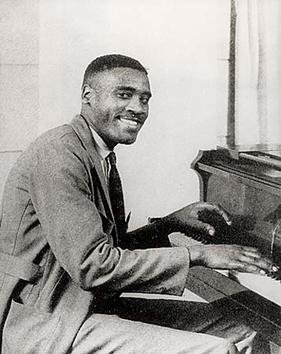Leroy Carr facts for kids
Quick facts for kids
Leroy Carr
|
|
|---|---|
 |
|
| Background information | |
| Born | March 27, 1904 or 1905 Nashville, Tennessee, United States |
| Died | April 29, 1935 (aged 30-31) Indianapolis, Indiana, United States |
| Genres | Blues |
| Occupation(s) |
|
| Instruments |
|
| Years active | 1920s - 1935 |
| Labels |
|
Leroy Carr (born March 27, 1904 or 1905 – died April 29, 1935) was an American blues singer, songwriter, and piano player. He became famous for his calm, smooth singing style, which influenced many later artists like Nat King Cole and Ray Charles.
A music expert named Elijah Wald called him "the most influential male blues singer and songwriter of the early 1900s." Leroy Carr first became well-known for his song "How Long, How Long Blues". This was his very first recording, released in 1928 by Vocalion Records.
Contents
Life and Music Career
Leroy Carr was born in Nashville, Tennessee. He grew up in Indianapolis, Indiana. He taught himself how to play the piano. After leaving high school, Carr traveled with a circus for a while. In the early 1920s, he also served in the U.S. Army.
Later, Carr returned to Indianapolis. He worked at a meat-packing plant. He got married in 1922. He also became a popular musician at parties.
Working with Scrapper Blackwell
Leroy Carr often played music with guitarist Scrapper Blackwell. Carr's gentle piano style mixed well with Blackwell's jazzy guitar. Their unique sound attracted many listeners. They started recording together with Vocalion Records in the 1920s.
Their first big hit was "How Long, How Long Blues" in 1928. Music experts described Carr's music as carefully written. It combined deep feelings with a bit of humor. His music had a light, swinging rhythm. It could also quickly change to a fast, dancing beat.
Popularity and Famous Songs
Between 1928 and 1935, Leroy Carr was one of the most popular blues artists. Even though he died young, he created a lot of music. Some of his most famous songs include:
- "Papa's on the House Top" (1931)
- "When the Sun Goes Down" (1931)
- "Blues Before Sunrise" (1932)
- "Midnight Hour Blues" (1932)
- "Hurry Down Sunshine" (1934)
He recorded for Vocalion until he signed with Bluebird Records. Bluebird was part of RCA Records. His last recordings were made with Bluebird.
Last Recordings and Passing
Leroy Carr's final recording session was in Chicago. This happened on February 25, 1935. During this session, Scrapper Blackwell left early. Carr then recorded his last song, "Six Cold Feet in The Ground," by himself.
Two months after this session, Leroy Carr passed away. He was about 30 years old. He died from a kidney condition called nephritis. He was buried in Floral Park Cemetery in Indianapolis.
Legacy and Influence
Leroy Carr's singing style helped change blues music. He made it more smooth and city-like. He influenced many famous singers. These include T-Bone Walker, Charles Brown, Amos Milburn, Jimmy Witherspoon, and Ray Charles.
Even jazz musicians like Count Basie and Jimmy Rushing recorded Carr's songs. Count Basie's band also showed the influence of Carr's piano playing.
Many artists have recorded Leroy Carr's music. Some of these include Robert Johnson, Ray Charles, Big Bill Broonzy, and Eric Clapton.
Leroy Carr was honored for his contributions to music. He was inducted into the Blues Hall of Fame in 1982.
Discography
- Blues Before Sunrise (Columbia, 1962)
- Masters of the Blues, vol. 12 (Collector's Classics, 1971)
- Leroy Carr 1928–34 (K.O.B., 1971)
- Leroy Carr & Scrapper Blackwell: Naptown Blues 1929–1934 (Yazoo, 1973)
- Singin' the Blues 1937 (Biograph, 1973)
- Leroy Carr, vol. 2 (Collector's Classics, 197?)
- Don't Cry When I'm Gone (The Piano Blues, vol. 7) (Magpie, 1978)
- Leroy Carr 1928 (Matchbox, 1983)
- Leroy Carr & Scrapper Blackwell: Great Piano-Guitar Duets (1929–1935) (Old Tramp, 1987)
- Leroy Carr 1929–1934 (Document, 1988)
- Leroy Carr & Scrapper Blackwell 1929–1935 (Best of Blues, 1989)
- Leroy Carr & Scrapper Blackwell 1930–1958 (RST, 1989)
- Naptown Blues (Aldabra, 1992)
- Leroy Carr, vols. 1–6 (Document, 1992)
- Prison Bound Blues (Snapper, 2001)
- P-Vine Presents 21 Blues Giants: Leroy Carr (P-Vine, 2001)
- The Essential Leroy Carr (Document, 2002)
- Whiskey Is My Habit, Women Is All I Crave (Columbia, 2004)
- Leroy Carr & Scrapper Blackwell: The Early Recordings of an Innovative Blues Master, vol. 1, 1928–1934 (JSP, 2008)
- How Long How Long Blues (Wolf, 2008)
- When the Sun Goes Down 1934–1941 (JSP, 2011)
See also
 In Spanish: Leroy Carr para niños
In Spanish: Leroy Carr para niños

